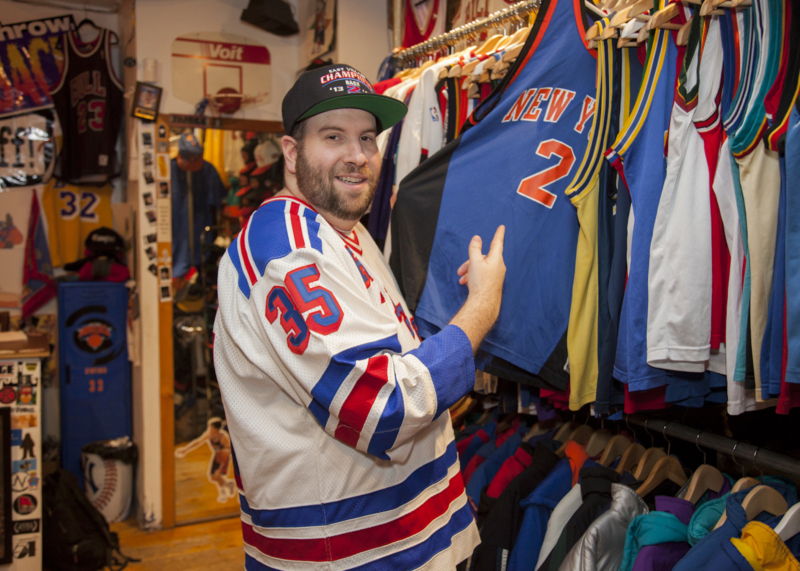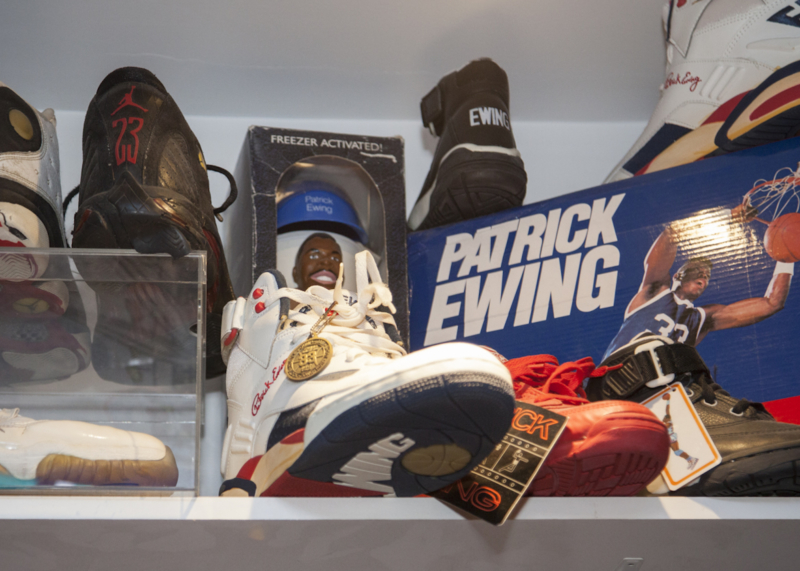A cardboard cutout of Michael Jordan stands in the storefront of Mr. Throwback, a supplier of vintage sportswear and other items in New York’s East Village. It belongs to the shop’s owner, Mike Spitz, and was an important decoration at his bar mitzvah 20 years ago in Bellmore, Long Island.
As with most items in the shop, Spitz can rattle off the entire history of the item.
“What’s special about the cardboard cutout is he’s not wearing Jordans in that,” says Spitz. “He’s actually wearing Penny Hardaway sneakers.”
During the 1995 NBA playoffs, “someone went into the locker room and stole his sneakers,” Spitz explains. So Jordan borrowed Hardaway’s shoes—Hardaway played for the Orlando Magic, the opposing team, and both players wore a size 13. “On the back of his sneaker,” says Spitz, “Jordan’s number is obviously 23, but Penny’s number 1, so he cut the number 1 off the sneaker.”
Telling stories like this is part of the job for Spitz and his four consignors. This is how they “build a culture around the original piece.”
“You can’t really teach sales,” says Spitz. “Anybody can be like, ‘Hey, that jacket’s cool. You should buy it.’ But if you knew what year it’s from, what the make and model are, you’re rattling off Bull’s nostalgic stats about Michael Jordan, and you can relate to your customer, and they have a good experience—they will come back.”

And the technique is working. Mr. Throwback’s clientele of sports fans all over the world includes rappers like Fabolous, Kid Cudi, and A$AP Mob’s A$AP Nast.
This is the difference between walking into a Modell’s versus Mr. Throwback. “I only buy jerseys that players have worn before,” says Spitz.
“I found out there was a girl working for the NBA store for two or three years,” he says, “and anybody who walked in and were like, ‘Where are all the vintage jerseys?’ She sent them to me. And I kept getting so much business. I’m like, ‘Who’s sending me people from Europe, and Japan, and Dubai?'”
It all started with eBay
The shop is small: 300 square feet. But “each foot is precious to me,” says Spitz. Like the ceiling decorated with beach towels from his childhood. The floating, bright orange Nickelodeon inflatable blimp. The small TV playing a VHS tape of Space Jam. The rows of Champion basketball jerseys, Starter jackets, and other sportswear. The shelves full of sneakers, Hey Arnold! and Alvin and the Chipmunks plush dolls, action figures like Tony Hawk on a skateboard and Shaquille O’Neal hanging victoriously from the rim, and a Joey Fatone “On Tour 2000 Collector’s Edition” marionette from *NSYNC’s No Strings Attached tour—still in its box.
Long before Mr. Throwback became a physical store, it all started with eBay.
In 2004, after college, “I started buying on one account on eBay,” says Spitz, “and then selling on another account. My buying name was probably like ibuyjerseys, and the next one was like mrthrowback, or something creative.”

In 2011, he finally decided to take his basketball jerseys to the Brooklyn Flea on weekends, where he knew some of the other sellers, and fell in love with talking to people in person about products and engaging in haggling.
“I enjoy that whole intense feeling of I have what you want, I have a price that I want, but if you come in with a decent offer—it’s like, live,” he says. “Instead of on eBay, where you can make an offer and then click ‘no,’ it’s like an intense feeling. And I have it here sometimes now.”
That next winter, in the freezing cold, he moved shop to the Hell’s Kitchen Flea Market.
“I lived in my parents’ house,” recalls Spitz, who commuted from Long Island. “I woke up at 4 in the morning, and I drove to the city, and I set up from like 6 to 6. I was just hustling jackets, and jerseys, and sneakers, and whatever I thrifted and had in my parents’ house.”
He ultimately moved to the Dekalb Market, across the street from Long Island University, where he worked full-time within his 80-square foot “mini store,” he remembers fondly. Until he and the other sellers got kicked out, that is—the land was bought and turned into a high-rise.
“I was just forced to find something else,” he says. “I went home for a month, and I was like ‘What am I supposed to do?’” Research on finding a store in New York City proved to be pretty bleak and very expensive.
But luck was in Spitz’s favor. During a day of thrifting in the East Village, he stumbled upon a very small empty store on 9th Street, between Avenue A and 1st Avenue.
“I looked in, and it was already done up,” he says, referring to the shelves and poles in place.
A week later, Spitz pops by, and the shop still hasn’t been rented. Mary, the owner of the building, passes by and asks Spitz if he’s interested in the store. They get to talking about his career in selling vintage.
“I love what you do,” she says. “We had a tenant here for 12 years selling men’s vintage Japanese clothes. The store is yours.”
Spitz gives Mary all of his money—“I had $250 left to my name in my account.” After painting, he and his 12 consignors—one of which, Will, started during the DeKalb Market days and is still part of the Mr. Throwback team—opened on a random Friday.
‘I love it because it’s my life’
Spitz still gets teary-eyed over Mr. Throwback’s heartfelt Yelp reviews.
“I love what I do,” he says, choking up. “I love it because it’s my life. At 33 years old, and you didn’t know what you wanted to do when you were a kid, and now you’ve found it. It’s like—it’s beyond.”
He remembers what a family friend once said: “After three years in business, technically you’re successful.”
“I beat that, so I feel successful,” says Spitz, mentioning he’s just signed another three years.
His parents are now proud of his business, but in the beginning, they had their doubts, due to both having a background in retail.
“They’re very old-school,” he says. “That generation is just: get a job, stay there for 30 years, work till you’re 70 years old, and just grab a paycheck. But this generation is so about just doing your own thing and not working for someone else.”
When customers mention that they’re thinking of starting their own business, Spitz tells them, “Do it. Because you will love it every single day.”
And, of course, you’ll be surrounded by the people and things that matter most: a kind woman named Mary, passionate and loyal employees, and a cutout of Michael Jordan wearing Penny Hardaway’s shoes.
Photo credit: Frank Mullaney




